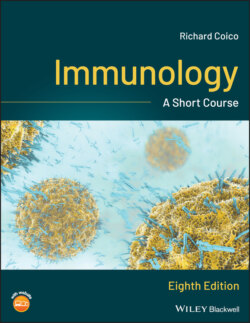Читать книгу Immunology - Richard Coico - Страница 103
SUMMARY
Оглавление1 The complement system—comprising approximately 30 serum and membrane‐expressed proteins—plays a key effector role in both innate immunity and antibody‐mediated adaptive responses to microbial pathogens.
2 Complement activation is a cascade that sequentially generates biologically active molecules. The major biological activities generated by complement activation are opsonins (enhancing uptake of pathogens by phagocytic cells) and anaphylatoxins (inducing inflammatory responses). The biologically active complement components interact with specific receptors expressed on multiple cell types. Complement activation also results in the direct lysis of pathogens.
3 Complement can be initiated by three distinct pathways: (a) the classical pathway, predominantly by antigen–antibody complexes binding to complement component C1; (b) the lectin pathway, mainly by terminal mannose residues on the surface of bacteria interacting with mannose‐binding lectin, but also by N‐acetyl carbohydrates binding to ficolin; and (c) the alternative pathway, by the deposition of complement component C3b on the surface of the pathogen. The alternative pathway has an amplification loop that greatly enhances activation.
4 The three activation pathways converge with the cleavage of C3 to form C3b and C3a.
5 The final stages of all complement pathways are identical: the formation of a membrane attack complex, comprising components C5b through C9. Formation of the membrane attack complex leads to lysis of the cell.
6 The activity of complement and its components is tightly regulated by several proteins. These are found in the fluid phase (factors H and I, C1 inhibitor, C4b binding protein) and on the surface of many mammalian cells (DAF, MCP, and CR1). Complement regulator proteins are not expressed on the surface of microbial cells.
7 Complement has important functions in addition to the generation of opsonins and anaphylatoxins, and cell lysis. These include enhancing B‐lymphocyte responses to antigen, controlling the formation and clearance of immune complexes, removal of dead and dying cells, and interactions with viruses.
8 Deficiencies of complement components, regulators of complement pathways, or receptors for complement components may result in increased susceptibility to infection or the development of inflammatory conditions.
